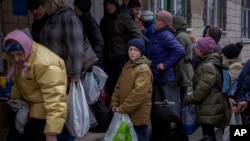Nearly two months into Vladimir Putin’s brutal and unjustified full-scale invasion of Ukraine, and already, the impacts of the war are being felt far beyond Ukraine’s borders. Global food security in particular is increasingly at risk.
“Ukraine and Russia are both major agricultural producers,” said Deputy Secretary of State Wendy Sherman at a meeting of the UN Security Council. “Thirty percent of the world’s wheat exports typically come from the Black Sea region, as does 20 percent of the world’s corn and 75 percent of sunflower oil.”
The Russian Navy is blocking access to Ukraine’s ports reportedly preventing dozens of ships carrying food for the world market from reaching the Mediterranean, said Deputy Secretary Sherman. Russia has also bombed at least three civilian commercial ships sailing form Ukraine.
“Russian missiles and bombs have damaged and destroyed Ukrainian airports, rail lines, train stations, and highways that are critical … for exporting wheat, corn, and other commodities.”
According to Ukrainian Foreign Minister Dmytro Kuleba, “Russia is actively targeting grain silos and food storage facilities,” said Deputy Secretary Sherman. “All of these actions by Russia are creating a food crisis in Ukraine – and well beyond Ukraine’s borders.”
“Already, food prices are skyrocketing in low- and middle-income countries as Russia chokes off Ukrainian exports. Across the Middle East and Africa, already-high prices for staple commodities, including wheat, have risen between 20 and 50 percent so far this year.”
“We are particularly concerned about countries … which rely heavily on Ukrainian imports to feed their populations,” said Deputy Secretary Sherman.
“The World Food Program is already feeding 138 million people in more than 80 countries – from Ethiopia to Afghanistan, South Sudan to Yemen, Nigeria to Syria. But now, Putin’s war is driving up the costs of providing food assistance. And the [U.N.] Food and Agriculture Organization, FAO, estimates that as many as 13 million more people worldwide may be pushed into food insecurity as a result of Russia’s invasion of Ukraine.”
“Ultimately, the only way to end this humanitarian catastrophe is through a durable ceasefire and the complete withdrawal of Russian forces from Ukrainian territory and away from Ukraine’s borders,” said Deputy Secretary Sherman.
“That decision … lies with one man and one man only. Vladimir Putin started this war. He created this global food crisis. And he is the one who can stop it.”






